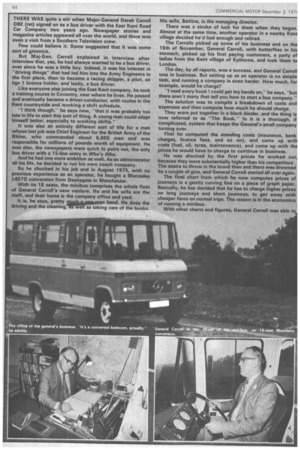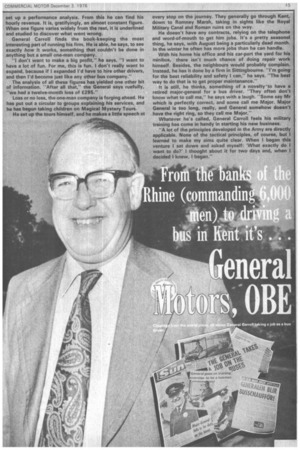THERE WAS quite a stir when Major-General Derek Carroll OBE
Page 46

Page 49

If you've noticed an error in this article please click here to report it so we can fix it.
(ret) signed on as a bus driver with the East Kent Road Car Company two years ago. Newspaper stories and magazine articles appeared all over the world, and there was even a visit from a Southern Television crew.
Few could believe it. Some suggested that it was some sort of gimmick.
But Maj-Gen. Carroll explained in interview after interview that, yes, he had always wanted to be a bus driver, ever since he was a little boy. Indeed, it was his interest in "driving things" that had led him into the Army Engineers in the first place, then to become a racing skipper, a pilot, an hgv 1 licence holder, and lastly, a bus driver.
Like everyone else joining the East Kent company, he took a training course in Coventry, near where he lives. He passed and eventually became a driver-conductor, with routes in the Kent countryside and working a shift schedule.
"I think though," he says now, "that it was probably too late in life to start this sort of thing. A young man could adapt himself better, especially to working shifts."
It was also an entirely different sort of life for a man whose last job was Chief Engineer for the British Army of the Rhine, who commanded about 6,000 men and was responsible for millions of pounds worth of equipment. He was also, the newspapers were quick to point out the only bus driver with a 15 line entry in Who's Who And he had one more ambition as well As an administrator all his life, he decided to run his own coach company.
So he chucked in his job and in August 1975, with no previous experience as an operator, he bought a Mercedes 1407D conversion from Deansgate in Manchester.
With its 18 seats, the minibus comprises the whole fleet of General Carroll's new venture. He and his wife are the staff, and their home is the company office and yard.
It is, he says, pretty n band. He does the driving and the cleaning,'T'veJ1 as taking care of the books. His wife, Bettina, is the managing director.
There was a stroke of luck for them when they began. Almost at the same time, another operator in a nearby Kent village decided he'd had enough and retired.
The Carrolls picked up some of his business and on the 16th of November, General Carroll, with butterflies in his stomach, picked up his first paying customers, a party of ladies from the Kent village of Eythorne, and took them to London.
The day, by all reports, was a success, and General Carroll was in business. But setting up as an operator is no simple task, and running a company is even harder. How much, for example, would he charge?
"I read every book I could get my hands on," he says, "but there aren't many that tell you how to start a bus company."
The solution was to compile a breakdown of costs and expenses and then compute how much he should charge.
They were put together in a black binder, and the thing is now referred to as "The Book." In it is a thorough, if complicated, system that keeps the General's small company turning over.
First he computed the standing costs (insurance, bank charges, licence fees, and so on), and came up with costs (fuel, oil, tyres, maintenance), and came up with the prices he would have to charge to continue in business.
He was shocked by the first prices he worked out, because they were substantially higher than his competitors'. The desire to throw in the towel then and there was drowned by a couple of gins, and General Carroll started all over again.
The final chart from which he now computes prices of journeys is a gently curving line on a piece of graph paper. Basically, he has decided that he has to charge higher prices on long journeys and short journeys, to get away with cheaper fares on normal trips. The reason is in the economics of running a minibus.
With other charts and figures, General Carroll was able t set up a performance analysis. From this he can find his hourly revenue. It is, gratifyingly, an almost constant figure. When one figure varies widely from the rest, it is underlined and studied to discover what went wrong.
General Carroll finds the book-keeping the most interesting part of running his firm. He is able, he says, to see exactly how it works, something that couldn't be done in anything but a small one-man company.
"I don't want to make a big profit,he says. '1 want to have a lot of fun. For me, this is fun. I don't really want to expand, because if I expanded I'd have to hire other drivers, and then I'd become just like any other bus company."
The analysis of all these figures has yielded one other bit of information. "After all that," the General says ruefully, "we had a twelve-month loss of £295."
Loss or no loss, the one-man company is forging ahead. He has put out a circular to groups explaining his services, and he has begun taking children on Magical Mystery Tours.
He set up the tours himself, and he makes a little speech at every stop on the journey. They generally go through Kent, down to Romney Marsh, taking in sights like the Royal Military Canal and Roman ruins on the way.
He doesn't have any contracts, relying on the telephone and word-of-mouth to get him jobs. It's a pretty seasonal thing, he says, with August being a particularly dead month. In the winter he often has more jobs than he can handle. I With his home his office and his car-port the yard for his minibus, there isn't much chance of doing repair work himself. Besides, the neighbours would probably complain. Instead, he has it done by a firm in Sittingboume. "I'm going for the best reliability and safety I can," he says. "The best way to do that is to get proper maintenance."
It is still, he thinks, something of a novelty -to have a retired major-general for a bus driver. "They often don't know what to call me," he says with a laugh. "Some say Mr which is perfectly correct, and some call me Major. Major General is too long, really, and General somehow doesn't have the right ring, so they call me Major."
Whatever he's called, General Carroll feels his military training has come in handy in starting his new business.
"A lot of the principles developed in the Army are directly applicable. None of the tactical principles, of course, but I learned to make my aims quite clear. When I began this venture I sat down and asked myself: 'What exactly do I want to do?' I thought about it for two days and, when I decided I knew, I began."






























































































































